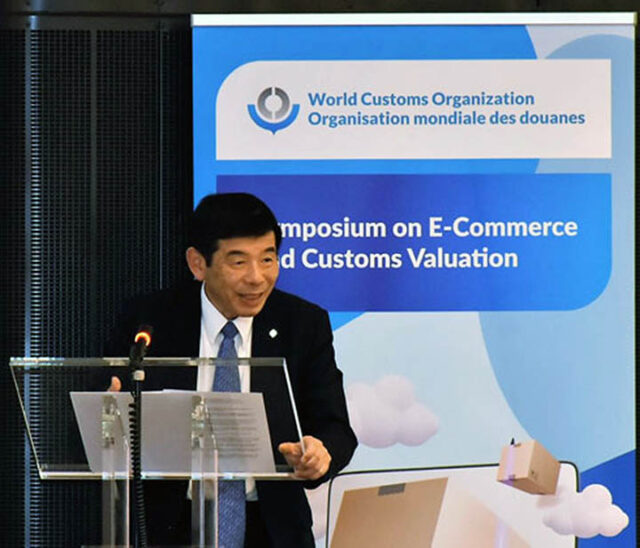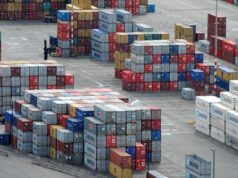
- The World Customs Organization’s first symposium on E-commerce and Customs Valuation tackled challenges in calculating Customs value as a result of rapidly increasing e-commerce activities
- Private sector representatives raised issues, including the need for common standards for Customs administrations on exchange of data and valuation assessment
- Retail presents significant challenges throughout the transaction chain with financial and non-financial risks inherent to the nature of e-commerce imports
- WCO is working on examining the Customs collection systems for e-commerce and on identifying innovative Customs control approaches for e-commerce imports
The World Customs Organization’s (WCO) first symposium on E-commerce and Customs Valuation on February 15 discussed the challenges in calculating Customs Value for e-commerce.
In his opening speech, WCO Secretary General Dr. Kunio Mikuriya recognized that “e-commerce brings enormous opportunities for economic and social development by fostering innovation, introducing new trade models, creating job opportunities and leading new consumer trends”. He also underlined the challenges associated with e-commerce and called for a concerted effort on the part of the Customs community and their partners for tangible solutions to those challenges.
In her address, Suja Rishikesh Mavrodis, Director of the Market Access Division at the World Trade Organization (WTO), highlighted various initiatives related to e-commerce, including potential ways to enhance cross-fertilization and learning through the trade facilitation and valuation committees, in conjunction with the WCO.
E-commerce volumes have grown significantly and rapidly in recent years. According to the United Nations Conference on Trade and Development (UNCTAD), the global value of e-commerce sales (B2B and B2C) reached almost US$26.7 trillion in 2019, corresponding to about 30% of world GDP.
The proportion of cross-border E-commerce—boosted by the COVID-19 pandemic—is constantly increasing and the trend is expected to last in the years to come.
In addition to changing the volume of transactions, e-commerce has favored a shift in international marketing channels from mainly Business to Business (B2B) large consignments to a large percentage of Business to Consumer (B2C), and even Consumer to Consumer (C2C), transactions, involving small consignments.
Although e-commerce offers a great potential for consumers and traders, especially small traders—in 2021, retail e-commerce sales amounted to approximately US$4.9 trillion worldwide—it presents significant challenges throughout the transaction chain with financial and non-financial risks inherent to the nature of e-commerce imports.
Many of these risks relate to the large volume of trade in small parcels created by e-commerce, giving the potential to overwhelm the Customs of the importing country and posing particular challenges for human resources and Customs clearance efficiency. Customs control approaches such as on-site document verification and post clearance audit may also encounter difficulties, especially in B2C and C2C scenarios.
Challenges to compliance
During the forum, the WCO delivered presentations on the impact of e-commerce on Customs valuation, the challenges from compliance perspective and the initiatives taken by the Secretariat in this regard, such as the WCO Framework of Standards on Cross-Border E-commerce.
Meanwhile, speakers from the European Union Commission, the United States’ Customs and Border Patrol and Indian Customs shared related Customs best practices. They also highlighted their experience on addressing the issues and ensuring the flow of e-commerce while still implementing the appropriate Customs controls and revenue collection.
Representing the private sector, the International Chamber of Commerce, DHL and Amazon, shared how they saw the current situation. Among issues they raised include concerns on goods moving across borders prior to a sale taking place, the diffused nature of the trading environment, and the need for common standards for Customs administrations on the exchange of data and valuation assessment.
The participants agreed on the importance of working together and sharing knowledge and best practices to find innovative solutions to the many challenges brought about by E-commerce.
WCO also noted that more intermediaries are likely to be involved in e-commerce transactions such as e-commerce platforms, payment systems and companies involved in the physical delivery of goods, which adds to the data possibilities and enables Customs to obtain data which might not be available in traditional transactions.
The popularity of e-commerce is also compelling Customs to look for ways to enhance data accuracy and quality by using advanced technology such as block chain to help bring different supply chain stakeholders together and increase the reliability of data for supporting Customs supervision.
The attendees also agreed that cooperation is needed between Customs and the e-commerce stakeholders, such as online marketplaces and platforms for compliance purposes, just as the collaboration between Customs and other authorities is necessary to address non-fiscal requirements such as safety and security risks.
The WCO emphasized that it is examining the Customs collection systems for e-commerce (fiscal aspects) and identifying innovative Customs control approaches for e-commerce imports (non-fiscal aspects).
RELATED READ: Various issues weigh on PH customs as it drafts e-commerce rules








